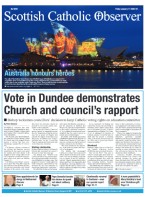September 5 | ![]() 0 COMMENTS
0 COMMENTS ![]() print
print

May your kingdom come but not yet
By Fr Ronald Rolheiser
A friend of mine likes to humour about his struggles in growing up. When I was in my 20s, he quips, I felt that by the time I was 40s I would have grown-up enough to let go of my bad habits. But, when I turned 40, I gave myself an extra ten years, promising myself that by age 50, I’d have conquered these habits. Well, now I’m my 50s and I’ve promised myself that by age 60s, I’ll be more mature and more serious about the deeper things in life.
Most of us, if we are honest, have a similar story. We’re well intentioned, but we keep pushing the things we need to change in our lives off into the future: Yes, I need to do this, but I’m not ready yet. I want more time. Sometime in the future I’ll do this.
That’s a near-universal sentiment, and for good reason. The tension we experience between our desire to grow-up and our perennial procrastination and infinite stalling in doing that, reflects in fact a tension that lies at the heart of Jesus’ message, a tension between God’s promises as being already here and God’s promises as still coming. Simply put: Everything Jesus promised is already here and everything Jesus promised is still coming. We’re already living the new, resurrected life, even as we’re waiting for it still to come. What lies inside this paradox?
Biblical scholars and theologians tell us that everything Jesus came to bring us (the Reign of God, the Kingdom of God, the New Age, the Final Age, the reign of justice on this earth, new life, the resurrection, eternal life, heaven) is already here, except that it’s also still coming. It’s here now, but not fully; a present reality, but in tension. And it’s still coming, in its fullness; still to arrive, in ecstasy. It’s already here and it’s still to be realised. For instance, when Jesus says that he has come to bring us new life, he is not talking simply about our future our lives in heaven; he is also talking about our lives here, already now. The new life is already here, he assures us. Heaven has already begun.
Jesus preached this very clearly and the problem was not that his hearers didn’t understand Him. They understood; but, almost universally, they resisted that message. Much as they yearned for God’s Kingdom to be already here, like my friend who keeps asking for another ten years to get his life in order, they preferred to push things into the future. Having God become concrete in their lives was far too threatening.
Gerhard Lohfink, the renowned Biblical scholar, aptly articulates both the resistance that Jesus’ hearers had to this part of his message and the reason for that resistance: “Jesus’ hearers prefer to push everything off into the future, and the story comes to no good end. The reign of God announced by Jesus is not accepted. The ‘today’ offered by God is denied. And that, that alone, is why ‘already’ becomes ‘not yet’. …. It is not only in Nazareth that the ‘today’ of the Gospel was not accepted. Later also, in the course of the church’s history, it has again and again been denied or rendered toothless. The reason was the same as in Nazareth: apparently it goes against the human grain for God to become concrete in our lives. Then people’s desires and favourite notions are in danger, and so are their ideas about time.
It can’t be today, because that would mean that our lives have to change today already. Therefore it can lie, hygienically and snugly packed, at rest, inconsequential.”
I suspect that all of us can relate to that: It’s very threatening to have God become ‘concrete’ in our lives, as opposed to God simply being a reality that will one day become very real. Because if God is ‘concrete’ already now that means that our worlds have to change now and we have to stop pushing things into the indefinite future. This isn’t so much a fault in faith as it is a procrastination, a stalling, wanting of a little more time before we need to get serious. We’re like the guests in the Gospel parable who are invited to wedding banquet. We too want to go to the feast, intend to go to the feast; but, first, we need to attend to our marriages, our businesses, our ambitions. We can get serious later. There’s time. We fully intend to take Jesus seriously; it’s just that we want a little more time before we do that.
We are all, I suspect, familiar with St Augustine’s infamous prayer. After converting to Christianity at age 25, he struggled for another nine years to bring his sexuality into harmony with his faith. During those nine years, he prayed this way: Lord, make me a chaste Christian… but not yet!
To his credit, unlike many of us, at least eventually he stopped pushing things into the indefinite future.
— Fr Ronald Rolheiser is a priest and member of the Missionary Oblates of Mary Immaculate. He is president of the Oblate School of Theology in San Antonio, Texas. Visit his website at www.ronrolheiser.com










